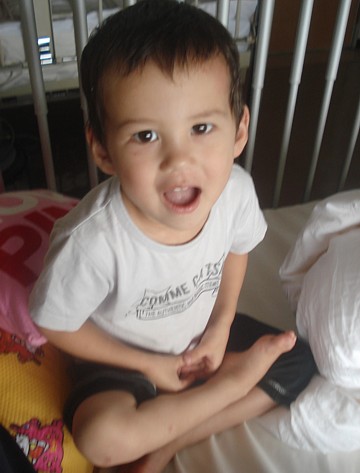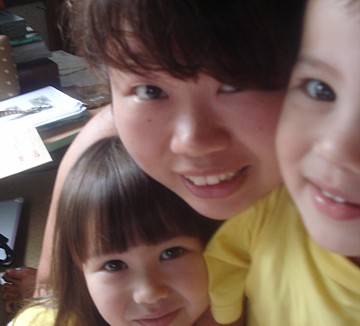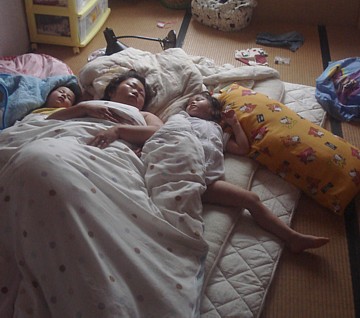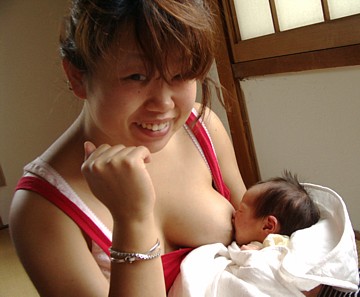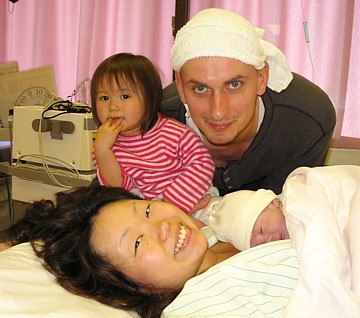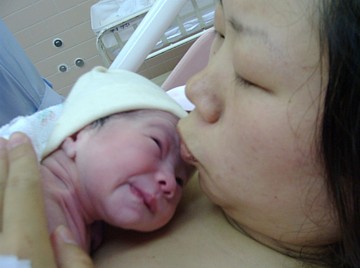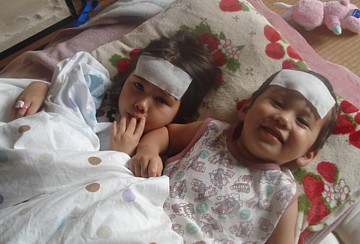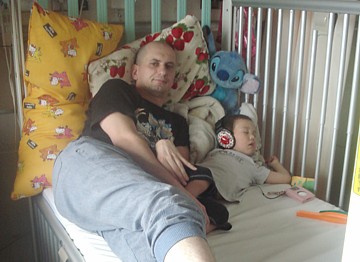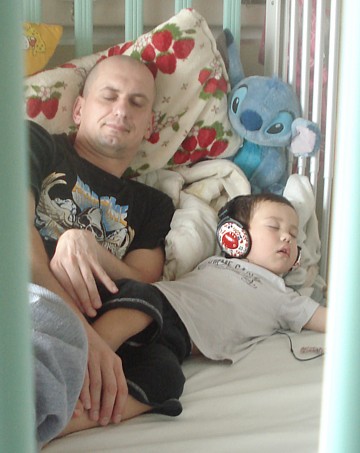|
|---|
Twelve Years Since Aum (Part 16) 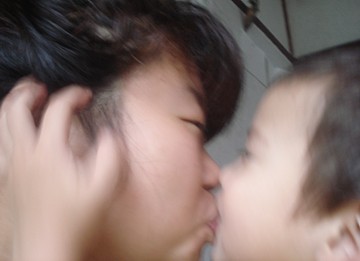 |
"Skinship" is a word widely used in Japan. According to the Japanese Wikipedia article on "skinship", it means physical intimacy or closeness between mother and child and was first used by an American at a WHO conference in 1953. The word is regarded though as an example of "wasei-eigo", "English made in Japan". In Korean English, or "Konglish", to seems to be used as meaning "petting", while the English Wikipedia article on "skinship" tells us that the word is used as "sharing a bath naked". But if you google for "skinship", you find even English blogs on skinship that explain that skinship "describes the closeness between a mother and her child due to the physical contact of their skin. Skinship develops through breastfeeding, co-sleeping, baby massage or simply by carrying and holding your baby". Or an article on Skinship: Better Bonding with Baby, that says: "In Japan, the closeness between mother and child is so much a part of the culture that there's a word for it: skinship. Parents in our country may never have heard of it, but that doesn't mean they can't practice it - by freeing babies from containers whenever possible, holding them, rocking them, and making plenty of eye contact. By playing with them - which it's never too early to do!" Some may think that skinship not only costs lot of time and energy on the side of the parents, but also hinders the children to grow into really free, independent individuals. Don't they need to be thrown into the "cold waters" of this world sooner or later anyway, where they will have to swim on their own, without the help of their parents? And isn't it better that they learn to do that as early as possible, to help themselves rather than wait for the help of others? I remember my fathers reaction when my wife and me visited him in Germany with the kids two years ago. While we where talking in the living room, my wife was always listening if there was no noise of a crying baby in our bed room, which was some distance away. Even though engaged in the conversion, the better half of her mind seemed always to be with the kids. Amused by this, my father told her: "Even if they wake up and start to cry, they'll cry themselves back to sleep anyway. So don't worry!" And I also recall the story that my grandfather used to tell me: "The whole family was taking a walk with your mother and the stroller and all, but when the road got worse and your mother got tired of pushing the stroller, I told her to just leave it by the side of the road so that we could pick you up when we got back. First she was worried that someone would steal you, but who would steal a baby in the middle of the woods? And when we came back, you were still there and had cried yourself to sleep long ago!" The moral of this story was also that a mother shouldn't be too attached to her child, otherswise she is just burdening herself.
This way of relating to small children is un-imaginable in a country like Japan, where people usually don't use strollers anyway, but carry their children on their back and sleep with them at night, sharing the same futon. To live as a family in Japan means to share one's skin, therefore: "Skinship". Quite different for example from the world of Maurice Sendak's "Where the Wild Things Are", which I and so many other kids loved to read when we were young, where the boy - "absolutely at war with the civilized aspects of his household" - is shut into his room by his mother - without being allowed to eat dinner. After a long time ("almost over a year") that he spends alone with the "wild things" he created in his mind, he returns back to the reality of his room, to find his dinner by the side of the bed - "and it was still hot", the text at the end of the book says. Some interpret this as an expression of the love of the mother, who has forgiven her rebellious son. A Japanese mother would wonder why the mother doesn't eat with her child then, why is shhe just leaving hot food in his room without letting him feel the warmth of her skin? Seen from the background of Japanese parenting, Sendak's book turns into a depressingly lonely and sad story. But anyway, is the Japanese way of bringing up children turning them into dependent beings without their own will? Some kind of spoiled zombies? I don't think so.
Be that as it may, I found it interesting that one of the skinship sites on the Internet mentions something called "attachment parenting". The article quotes from a proclamation that asks us to "envision a world where every child should be wanted, welcomed, loved, and valued; every family is prepared for and supported in practicing the art and science of nurturing children; adults respect children and honor childhood; children joyfully participate in the vital life of family and community; and dynamic, resilient life-honoring cultures flourish." To achieve this, breastfeeding and co-sleeping are mentioned, and the author asks: "Is it that new mothers don't know that their infants need to sleep with them so they can learn to regulate their respitory and circulatory systems? Do they not know that breastfeeding is more than just the best nutrition; it fosters deep attachments so that the child's neurological pathways can develop?" In orthodox Buddhism, attachment is often seen as the root of all evil. Two months ago I wondered if the practice of a bodhisattva involves an extention of the diameter of attachment, rather than its elimination, especially when it comes to living as a family. Maybe we should allow ourselves and our children to grow "deep attachments".
In 1991 the UNICEF launched the "Baby-Friendly Hospital Initiative". A hospital is listed as baby-friendly, if it keeps to ten steps to succesful breastfeeding. Among these are:
Both of our two kids were born in one of the only 14 baby-friendly hospitals in Japan. Some industrialized countries (like France for example) do not have a single baby-friendly hospital, while China alone has more than 6000, and the Philippines have 1250. The thirty industrialized countries on the UNICEF list have together only 262 baby-friendly hospitals, which is less than 2% of the world total (14.994 baby-friendly hospitals) - with some contries like France having none at all (by 12/9/00). The nurses at the hospital where Megumi and Hikaru were born made a point out of placing the baby on its mothers chest right after birth, without washing it and before doing any medical checks. I was there at both births and before Megumi was born I always had the idea that babies cry a lot right after birth. I had even heard that babies are slapped on their behinds right after birth, to make them cry so that they can use their lungs and breath deeply. Megumi though didn't cry at all while she was lying on her mother's chest. Neither did the doctor or any of the nurses make a move to slap her.
Why do I write all this? My son Hikaru, who is two and a half years old now, had to be hospitalized for five days with pneumonia in July. Unlike what I remember from my own childhood, parents in Japan are not only allowed to stay with their children all day and night long at the hospital, they are actually expected to do so. The parents have to feed the child, help them with toilet business, wash them, sleep with them. If both parents are busy, usually a grandparent will care for the child at the hospital. My wife and I had agreed to take turns at spending time at the hospital, while the other one would take care of our daughter Megumi.
Next time, I want examine how skinship, which is one form of bodhisattva practice, differs from the idea of adult practice, which guides us in our way we live together as a community of practioners. Eventually, I also want to examine the negative aspects of a monk living with a family, and what this might have to do with the degeneration of Japanese Buddhism. (After reading this article, a friend send me this link to a site about Jean Liedloff's interesting Continuum Concept. There are also Wikipedia articles about Liedloff and her concept. The article mentions also the diametrical opposite Ferber method, which seems to be based on the idea that babies should simply "cry it out", supposedly helping them to become more independent individuals. That though that sounds more like an excuse to me, probably the parents just want more "time for themselves".)
(to be continued ... Docho)
|
|---|
